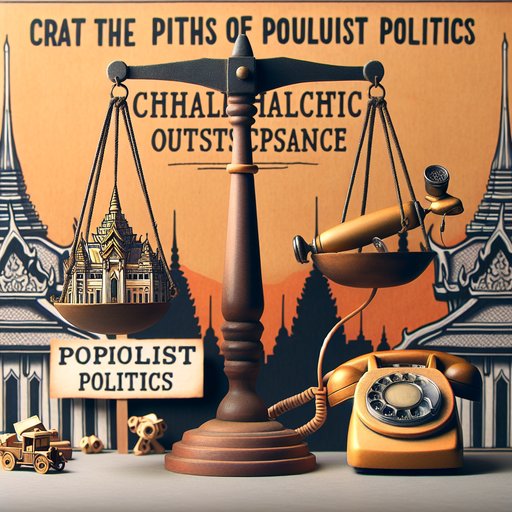
The Thai court's decision to suspend Prime Minister Paetongtarn Shinawatra over a leaked call is more than a national scandal—it's a cautionary tale in the global narrative of populist politics and its inherent vulnerabilities. This incident underscores the risk of electing leaders based on charisma rather than competence, a trend that threatens to erode democratic institutions worldwide.
At the heart of the issue is the troubling tendency for modern democracies to elect leaders who capture the public’s imagination but may lack the nuanced understanding required to govern effectively. In a world increasingly driven by soundbites and social media virality, political campaigns often prioritize emotional appeal over substantive policy knowledge. This dynamic is evident in Thailand, where Paetongtarn Shinawatra rose to prominence not through a track record of effective governance, but through an ability to resonate with a wide swath of the electorate. The suspension following the leaked call reflects a broader, systemic issue that spans continents: the precarious balance between democracy as a means of representation and as a tool of popularity.
In countries like the United States, the valorization of direct democracy often leads to a similar tension. Politicians, like those pushing through the 'big, beautiful bill' in the House, are frequently chosen for their rhetorical prowess rather than their legislative acumen [1][2]. This results in policies that may reflect the mood of the moment more than long-term, strategic consideration. The Republican rush to pass Trump's megabill reveals how factional interest can override comprehensive scrutiny, a phenomenon exacerbated by the slim majorities and the specter of redistricting battles [3][4].
Meanwhile, the suspension of Thailand’s prime minister is a stark reminder of how quickly the tides of public opinion can turn when leadership fails to meet the practical demands of governance. Populism, with its promise of returning power to the people, often results in the elevation of leaders who are untested and unprepared. This is not just a Thai problem; it is endemic to any democracy that values electoral popularity over procedural rigor. Paetongtarn Shinawatra's suspension should prompt a reevaluation of how leaders are chosen and held accountable.
The Plebeian Council model cited as an empowerment tool [5] highlights the potential of more participatory mechanisms to guide representative selection and enhance governance. Yet, such models must be implemented carefully to avoid the pitfalls of populism that Thailand’s current crisis exemplifies. The allure of direct voting systems lies in their promise of accountability and transparency. However, when these systems prioritize immediate electoral success over long-term policy efficacy, they risk breeding cynicism and disenchantment among citizens.
This is evident in the U.S., where political battles are increasingly fought on the battlegrounds of media influence and partisan divides, rather than through dialogues centered on shared national interest. As Elon Musk's formation of a new political party suggests, even within established democracies, there is a growing appetite for alternatives to the traditional party structures [6]. What the Thai court’s decision reveals is the need for a more profound commitment to political integrity and competence. Democracies must invest in systems that assess leaders based not only on their ability to connect with voters but also on their capacity to navigate the complex landscape of modern governance.
This involves creating electoral processes that demand a higher level of scrutiny and accountability, akin to the rigorous vetting processes found in the business world. Only then can we ensure that elected officials are truly fit to govern, rather than simply popular enough to win elections. In conclusion, the suspension of Thailand's prime minister is a timely reminder of the vulnerabilities inherent in populist-driven politics. As democracies worldwide grapple with the challenge of maintaining legitimacy in an era of instant gratification and polarized electorates, the focus must shift towards fostering a political culture that values depth and diligence over mere charisma.
By doing so, democracies can safeguard their institutions against the whims of populist tides, ensuring that they remain robust, resilient, and representative of the true will of the people, rather than the fleeting fervor of the moment.
Sources
- House begins work on Trump megabill, Johnson says vote could come Wednesday (ABC News, 2025-07-02T07:48:23Z)
- House Passes ‘Big, Beautiful Bill’ in Legislative Triumph for Republicans (Daily Signal, 2025-07-03T18:37:39Z)
- GOP eyes redistricting in Ohio and Texas as it looks to bolster slim majority (The Hill) (Memeorandum.com, 2025-07-05T23:00:01Z)
- House Republicans race to pass Trump's megabill amid GOP divisions (CNBC, 2025-07-02T13:32:46Z)
- The Plebeian Council as an Example for Modern Citizen Empowerment (Nakedcapitalism.com, 2025-07-03T04:24:41Z)
- Trump says Musk ‘off the rails’ for forming political party to rival GOP (Cointelegraph, 2025-07-07T03:31:35Z)









































